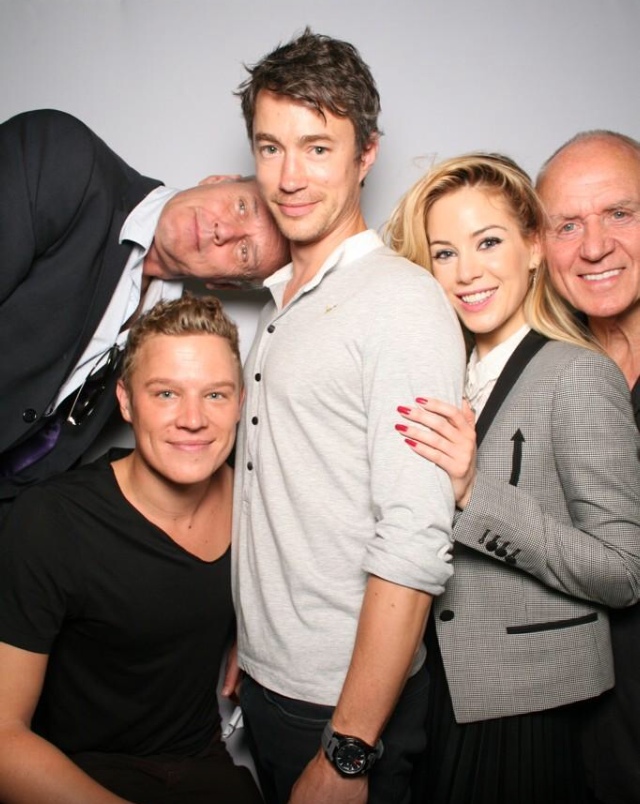Mark Neveldine, Brian Taylor (writers) and Marc Schölermann (director)
So, my other job is translating movies into Spanish, and I worked on Crank last year…
Mark Neveldine: Oh, my God!
Brian Taylor: My deepest apologies!
No, no! I loved Crank!
MN: Who paid you to say that?
No, for real! I’m such a guy for movies, I swear to God!
BT: That’s awesome!
Anyway, Crank had a very specific, frantic pace dictated obviously by the premise. Since Pathology deals mostly with death and the game, what’s the pace we can expect?
MN: It’s a completely different movie style. Brian and I write for all genres, and this is a story we’ve had in our heads for years, so the pacing is a lot different—I don’t wanna say slower; it’s just moves at its own speed. Crank was a frenetic, wild action film that followed the guy whose heart would stop if he ever stopped; this is a little more medical, so we really slowed it down. Marc can really speak for that; he knows Crank really well too.
Marc Schölermann: Yeah, it’s a completely different movie; it’s not like you’re gonna see Crank in a hospital or something! (laughs) It’s more of a thriller than it is an action film, it doesn’t have really any comical elements that made Crank so great in it, so it’s completely different, with a different pace, obviously. So, we spent a lot more time with setting up the characters, making them real. But the film actually moves pretty fast once you’re in the story and once everything gets going.
MN: Yeah, there’s humor in the movie, but it’s a different kind of humor. When we went down to do research at the L.A. County Morgue, there are people working there that play Frank Sinatra, that make jokes, that take pictures—there’s one guy, like, diving into a Y cut and the other one is taking a photo! (laughs) I mean, this is their life, and they want to have it be light! There are moments that are light in Pathology, which is really nice and you don’t see it in these horror-thriller films. It’s not like all these other “cut-‘em-up/torture” films, not at all!
BT: What we think it has in common with Crank is, they’re both intense experiences that you haven’t had before. It’s an original movie that will touch you in a place you haven’t been touched before; hopefully Crank did the same thing, but beyond that, it’s completely different.
MS: And it’s not about guts and gore at all! People are going to be surprised at how tame it is when it comes to gore; I think everybody expects it to be the bloodiest film of all time or whatever when you hear the film’s name Pathology. Actually, it’s very psychologically intense; there’s gore in it, obviously, because we deal with autopsies and pathology rooms, but it’s not about showing it, and everything you see in that movie is based on reality. If there’s a cut where they’re using rib shears, this is what happens there every day; it’s not something we made up or something that we tried to make as disgusting as possible. That’s the way it is, and it looks the way it does down there. Everything is basically grounded in reality; there’s nothing that we just made up just to scare people.
MN: Yeah, it seems that they’re raising the bar with horror films these days by blood and gore, and not by getting back into the characters and the story, and we feel the bar in a different way.

Mark Neveldine
In terms of researching for the perfect crime, any danger some criminal might pick up some new tips?
BT: (laughs) If they can pull off some of the outrageous things these guys do in the movie, more power to ‘em! I mean, there are some of the strangest, most unusual ways of dispatching humans in this movie that you’ll ever encounter, because these kids are geniuses! It’s very simple for them to figure out what the other guy did, so, in order to keep the game going, they really have to take it pretty far, past the point where—I don’t see there being any copycats.
Can you talk a little bit about your creative process together? Both of you are writers, and one is a director…
BT: It was really interesting for us. Obviously when we write a script, either as directors or just writers, we’ve a very specific idea in our heads about how things will look and how they’ll play and how they’ll cut together, so it’d have been very easy for us to just come in with a director and kind of be over his shoulder all the time…
MN: Going, ‘That’s not right! That’s not right!’
BT: We realized that would have been a terrible movie, so we got a director that we believe in, who’s a visual genius, who has a style that’s very different for us, and the best thing that we could do was support him whenever he needed support, but other than that, just get out of his way and let him go. And the final result is so rewarding! To see the thing you wrote imagined by someone so well, differently than what you would have done! It’s fun for us to watch the movie just as fans!
MS: It’s great because you’re artists too, and we had a great time! There was such collaboration. I even let Mark operate the camera a couple of times, because I wanted him to. We did some crazy, wild stuff!
How long was the shoot and where did you ended up shooting?
MS: 30 days, and we did it in L.A.
When you have the close-ups involving bodies, did you use actual cadavers, or actors in makeup, lying very still, or what?
MS: It’s a mixture of prosthetic bodies that were made specifically, for instance, when you have the ribcage opened up and all the organs removed? There was nothing that we could have applied to a living person, so there was that. Then there was… extras, dressed up in makeup specifically for the occasion. You can’t shoot real bodies; they don’t let you do that, and there’s really no reason to do it. Another thing is, you try to make makeup as realistic as possible, and when you go down to the morgue and you see 250 bodies lined up… there’s nothing more fake looking! You go down there and say, “If I saw this in a movie, I’d say these are the worst makeup effects I’ve ever seen!” It’s really weird! So, we tried to walk the difference between what looks fake and what looks real to you, or what you would expect things to look like.
BT: By the way, there are real organs and parts in the movie, we just can’t tell you where because then we’d get in trouble!

Brian Taylor
I’ve never been to the morgue, but I figure it’d be a really tactile experience, with the smells and the textures. How did that
translate to the screen?
MN: Well, there’s nothing we could do about the smells…
BT: Remember “Smell-a-Vision”?
MS: I don’t know, when you walk in and you see the corridor, that’s what the morgue looks like. They don’t have to make it glamorous, because nobody ever goes down there, so it’s more like a practical basement with tiled rooms and those metal tables. There’s nothing really fancy; we just tried to make it as real as possible, and as I said before, we didn’t go for a highly stylized look when it comes to that. You can pretty easily go for something that looks fancy, almost like a space ship, but we didn’t want to go that route; we wanted it to be as real-looking as possible, so I’d say, in general, we succeeded pretty well.
MN: And if you want to know how it smells, just go to Whole Foods and walk by the meat section. That’s how it smells, pretty much.
MS: A lot of smell of meat, and detergents… lots of bleach, so a mix of that.
Did you look at other films for inspiration regarding the look of the film?
MS: Obviously, I brought up a couple of things for style; it’s, again, not highly stylized. One of the things we did was shoot everything in shadow; there’s no sun hitting Milo’s face until he’s back with his fiancée; everything else is desaturated by the nature of the location. There’s nothing that will make it look like a music video or a commercial, it’s more based in reality that way. We took our chances with making sure that everything fits really well, and nothing pops out.
MN: Mark is like a walking IMDb! He’s seen thousands and thousands of movies, and can bring up every director, costume designer, etc. so he’s obviously influenced by cinema in general. He’s amazing!
Have you played the film for test audiences yet?
MN: Not yet, but we want to!
Cos I’m interested in hearing their reaction.
BT: So are we!
Is there a particular scene that you’d like to talk about to tease the audience a bit?
MN: We’d be giving away so much!
BT: The scenes that are most powerful in this movie are a combination of story elements and character elements that, when they finally happen, they’re going to devastate people. So, we can’t give you one like, “Yeah, Jason and Amy go at it in Chinatown!” There are no gimmicky scenes like that; it’s all engineered so that, when it reaches a certain point, it’ll knock people down!
MN: We mentioned in the panel the scene where “Jake” decides to branch out from the criminals he usually disposes of in the game and kills some prostitutes. That’s a pivotal point.
BT: Yeah, any scene where Milo and Michael are going head to head, it’s like the snake and the mongoose! I mean, the chemistry between these two guys is really fun to watch. It’s one of those classic confrontations…
Can you talk about casting Milo as “Ted”?
BT: Milo auditioned for us, and early on we decided that anybody who wanted to be in the movie had to be auditioned.
MS: What happens is, if you go to an agent and offer the part, they say, “Make an offer,” which means you’re giving them money and the part is cast. This script is so powerful that we really needed to see who could play the parts, so it wouldn’t be messed up in any way, not even by a mediocre actor. It’s a really strong, character-based script, so that’s why everybody had to read, and whoever didn’t want to read, is not in the movie.
MN: Yeah, he came in and he kicked ass! We loved the turn from Milo’s character in Heroes to Pathology; it’s incredible!
BT: It’s kind of similar to Crank in that we have our hero engaging in the most anti-social, horrible behavior possible, and we still expect the audience to like him and care about him and want him to win. You need a guy that’s so intrinsically likeable, like a Jason Statham. People just love the guy, and it doesn’t really matter what he does; he can be a complete sociopath and they’re still gonna like him. It’s the same thing with Milo; he has quality of goodness about him that no matter what he’s doing, you still want him to win, you still like him. We needed a guy like that.
Did you get all your actors together for rehearsal prior to shooting?
MS: For the most key scenes, we rehearsed the entire group of six together for a day. We went through the same things, broke ‘em down, decided how we would shoot it, so when it came time to actually shoot it, it was pretty easy.
Milo Ventimiglia (“Ted”) and Lauren Lee Smith (“Juliette”)
Lauren, is it your first time at Comic-Con?
Lauren Lee Smith: I was here once about 7 years ago, for like three hours. I came for a show I was on, Mutant X.
How do the experiences compare?
LLS: You know, I haven’t had a chance to wander around yet because I got here late afternoon, but I’ve heard…
Milo Ventimiglia: It’s pretty crazy! It’s my second year here; we did the Heroes panel last year, and Comic-Con kinda kicked Heroes off. It built up awareness, and everybody who comes to Comic-Con, in a way, they’re the ones who’ll start the buzz online.
Before we were just learning about the show, and now it’s out in full force…
MV: I mean, last year it was 2,000 people seeing our show and talking about it; this year, it was 6,000 people, we had room for 4,000 only… It’s like being The Beatles; it feels quite amazing! I’ve played roles where people really, genuinely hated me and they’d come up and tell me that, and now it’s all smiling faces, and having people approach you with just a joy in their hearts makes me feel like I’ve done my job well, and I hope that we can continue to do it for a long time.

Milo Ventimiglia
The writers told us earlier that your scenes with Michael are really explosive. Can you tell us about that?
MV: Michael Weston is an intense individual! (laughs) It’s funny; you look into his eyes and he has such a kind-hearted nature about him, that I kept thinking to myself: “Okay, Jake is evil; he’s so bad! Can this guy really do it?” And I remember watching him rehearse and find those beats as Dr. Jake Gallo, and the madness in his eyes! So, once we got to set, I was giving him as much as he was giving me, and holy shit! I literally—I hold that guy’s name in high regard around town, and I make sure that people know about him, because there was such an honesty behind his eyes and in the performance, and… *censormode*, it’s just fun! I think that I give a lot of myself not only to the character, but to the people I’m working with, and when you see that reflected back, and they’re giving you as much, it’s just a constant
collaboration. The scenes with Michael are just amazing; at times I felt like I was just trying to keep up, you know? Because the cameras would start rolling, and he’d just, boom! There’d be so much intensity and darkness and madness in his eyes, and you’re trying to match that, to counter that. Michael’s and my character are on the same plane; as bad as Jake is, Ted has to match him and then even surpass. You worked with him too…
LLS: Yes, incredible! Incredible actor! When I was about to audition, I read the script and I thought, “God! Michael should play ‘Jake’!”
MV: Really?
LLS: Yeah, I’d worked with Michael in The Last Kiss, and I told Tom Rosenberg…
MV: Tom Rosenberg is the president of Lakeshore Films.
LLS: …I told him, “I know the guy for this!” And luckily he came on board, and it was fantastic. He would switch something, and his eyes would be… it’s insane, it really is!
MV: As an actor, too, you want to go against those people that can go to that dark place, that can get there, and that can do the scene and yet, when the camera stops, they come around, like him, and go, “Hey, bro! I’m sorry, I love you!” He’s such a warm individual, as was everybody, that it wasn’t a bad thing showing up to work in something so dark and so twisted. Everybody was so genuine about what they were giving, and when the cameras were off, they’d just be sitting around, having a good time. There really were no assholes in the group, which led me to believe that I was the asshole! (laughs) I kept thinking, “I must be him!” (more laughs) But, no…

Lauren Lee Smith
What was it like working with Mark as a director?
MV: Very good, very good. He’s got a style; it’s so funny… You need a leader; you need a guy to guide the ship, someone to tell you what they’re shooting, what they’re working on, and he was always so excited and so giving of how he envisioned the piece, you know? Whether you were here, here or really far wide, and also just like the sentiment of the moment, because sometimes you’re jumping all over the place with the script and you don’t really know where you are, and he was always there to remind you and bring up the correct frame of mind for the shot.
LLS: It’s just so lovely to show up to work, and your director shows up every single day with the same amount of passion and his vision. It was really, really nice.
Heroes is a dark show, but Pathology is…
MV: Dark-ER! (laughs)
How do you think your fans are going to react to the movie?
MV: As far as fan reaction, I really, honestly hope that people don’t get so connected to one character that they only see me as that one character. Understand, I’m an actor, I’m malleable and I’m gonna play a lot of different characters in my career. I hope their reaction is just one of, “Wow! I didn’t think he could pull it off, but he did! He’s doing something different!” I actually took photographs of the past four roles I did, and they all look like different people, going from Heroes to the music video I did for Fergie, covered in tattoos, to this movie, playing a murderous doctor, back to S2 Heroes. They’re all just different people! So, for me, I hope fans who’ve watched every job that I’ve done will be excited about seeing something different, you know? And still, they’ll see pieces of me in every performance.
Lauren, what’s the relationship of your character to the other characters in the movie? Where do you fit in this web of intensity?
LLS: My character, ‘Juliette,’ is part of this group that devises this game, and when we’re first introduced to her, you could say Juliette and Jake are together. Then “Dr. Ted Gray” comes into town, and there’s this sort of rivalry between Jake and Ted, and their twisted ways turn her on and she becomes obsessed with Ted, so she starts seducing him and trying to get him to become part of the group. And then, madness ensues! (laughs)
Mark and the guys said they all visited the morgue for research. Did you guys do the same?
LLS: Yes!
MV: Absolutely! That was one of the first questions I’ve asked after reading the script. To me, I am a realist, I want things to look real, whether it’s eating an ice-cream or cutting open a body, so I asked about the opportunity of going to the Coroner’s office, and they said, “Absolutely!” We spent quite a lot of time there; and it wasn’t about seeing bodies, because it gets old quickly. It’s about talking to these people, these technicians, these pathologists, these workers that are in the bowels of this building in Downtown L.A. It was, ultimately, what drove my performance, these people. I watched about 20 real autopsies. We saw a lot!
So, in a 30-day shoot, you really don’t have a lot of time to mess around.
MV: No! (laughs)
Given the subject matter being so dark, what was it like on set? What was the spirit of the cast?
MV: High times. Everyone was excited, you know? Knowing that we had a limited amount of time together, we bonded pretty quickly, everybody was respectful, everybody was just enjoying themselves, you know? There was a call for more blood, and everybody was clapping! This one (pointing to Lauren) loved the fake blood!
LLS: (laughing) Yeah!
MV: We had this stuff called HT Blood, which looks a certain way on camera, and we had bottles of the stuff. I’d be over there, on camera, putting it on my hands like lotion, and I’d turn around and Lauren would be there, like… (putting hands together, asking for some blood) It was a fun time; everybody was excited to be there. I think everybody had the same reason for it; they wanted to make a great film.
Milo, how did you approach this movie, as a horror film or a thriller…?
MV: Character drama. I approached it as a study of character; these people and what they go through to get into the art of murder. Like I said, these are people that know all the bodily functions and mechanics, the machine of the human body, the organic machine, and you gotta expect, at some point, after you know everything, what’s there to learn? Let’s go further, let’s go beyond that. Let’s find out how to disrepair a body, take it a part, and kill it in such a way that’s undetectable. So, I didn’t look at it as a horror/thriller/suspense film; I just found it a character-driven film that has some really cool elements about it.
Is your character the hero of the film?
MV: Anti-hero. He’s not doing likable things, you know? He’s doing drugs and sleeping with women that are not his fiancée, he’s killing! I mean, if you look at him from the 10 Commandments, he’s not really doing anything good. But, you gotta like him! That was actually my struggle with the character; he’s not likable, he’s not doing anything that you’re gonna smile about. How do you stay with him the whole movie? How
do you root for him to get out of there? How do you root for any of these characters? You die with Dr. Jake Gallo, Michael’s character; there are moments when he hurts so bad! You die with Juliette, Lauren’s character, cos she hurts so much, and you understand that pain and what they go through. You don’t understand the reason why they’re jumping to murder so quickly, but you stick with them because they’re really human characters.
I just wanted to point out that your fans kinda saw a darker version of Peter with Future Peter; whom I think kicks ass, by the way.
MV: Thank you!
So, you were talking about the duality of your character “Ted,” that starts nicer and then…
MV: The character starts with a direction; he has a beautiful, loving fiancée; he has a career; he’s at the top of his field, but he knows it all, and so it’s like, what happens when you know everything and you got the life that everybody admires? You get bored with it. Not bored because of the people, but just bored with yourself. You want more, and so it’s the ego of wanting more, and he flips over and you see the dark side. He taps into that, and guess what? Every single person at this table has that, it’s just how accessible it is. So, playing around with Dark Peter Petrelli was cool, but this is very different. I think that when Peter went dark, that came out of pain, of what happened, of what he did. The weight of the world, the destruction of the world fell onto his shoulders. With Ted, it’s very singular. He doesn’t care about anybody else, but himself.
Michael Weston (“Ted”) and Johnny Whitworth (“Griffin”)
Michael, you had some fans in the audience out there.
Michael Weston: Yeah, I don’t know – it just felt like the Wizard of Oz, with the loudspeaker and all that.
Johnny Whitworth: I just want to know how he (pointing to the only male reporter at the round table) got to the only table where all the ladies are at.
I just know where to sit! (laughs) Can you tell us a little bit about the relationship between your characters in the movie?
JW: (deadpan) Lovers. (laughs)
MW: I think we have a really interesting friendship, because it’s sort of deep and starts before the film, and then by the time Milo’s character arrives, “Ted” starts to fray what was once a sort of better friendship, so as we push the drugs and all this sort of adrenaline-junkie stuff that we’re doing, murder and all that, it starts to really fray at all of us, personally and in our friendships, and everyone starts to sort of pull away and I’m like grabbing at the ropes, trying to keep everybody in the same room, and I think that creates a lot of really good conflict.
JW: I hope this is an answer to the question – it’s what was going on in my brain just now. I think of Griffin and Jake as best friend, but Griffin is not so much a follower, but someone who wasn’t that interested in life until he met somebody who’s interested in something, and he kinda gravitated towards it, which is the dead and the world they were in. You kinda feel like he was dead until he started playing this game and pushing the boundaries of what it is to feel, you know? And that gets threatened when Milo (“Ted”) shows up… and he starts to like Milo more!
MW: Milo becomes like a really worthy challenger, and my guy is sort of like the leader of this group, and has corralled everyone into this extravagant game of whodunit, and then I’m looking for a worthy opponent, and that’s when Milo comes in and everything starts to accelerate and drive to the edge, where some of us jump off. (laughs)

Michael Weston
The writers told us your scenes with Milo are very intense. Could you tell us about working with him and the process of creating that tension?
MW: He is a really wonderful actor to work with, because he’s so present! Basically—before I’ll touch an actor, I ask, “Is it OK if I touch your shoulder here?” Because you wanna keep it—and we got this incredible short-hand between us, where he knew anything went with me, and I knew anything went with him. We just played it hard and loose, and it was really, really fun because you never felt anyone was pulling out. If I went there, he was right there with me and vice-versa, and that’s a really wonderful way to work and I felt like it made those scenes really pop and fun to be in, and made us go places where none of us (the director, me or Milo) really knew was gonna go, and suddenly we’re doing something just to the left of what any of us thought it would be, so it was actually very rewarding.
JW: Everybody were really very giving actors, and Milo and Michael are both very strong and giving actors, so those scenes are just…
MW: I mean, really, in a movie you put so many people in so many jobs, and it’s such a collaborative effort, from every grip to every electrician, and to actually get everybody on the same page, going in the same direction, it’s a really difficult task. I’ve done several movies where I looked at them as a script and thought, “Great!” and by the end, you’re going, “What happened?” So, it’s really rewarding. Yesterday we were talking in the car, we’d seen the movie for the first time, and to get everyone going on the same page, it really takes a lot of dedication from the cast to make that commitment to communicating what you need to get the scene done. It was great, you know? It’s a really tight film.

Johnny Whit









